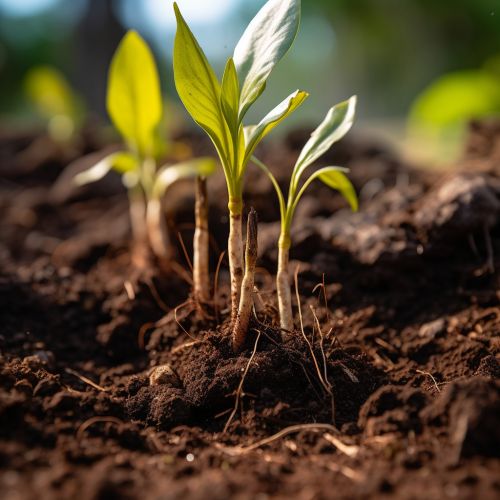The Role of Plant Root Exudates in Soil Ecology
Introduction
Plant root exudates are a significant component of the rhizosphere, the region of soil directly influenced by root secretions and associated soil microorganisms. These exudates play an essential role in soil ecology, affecting nutrient cycling, plant growth, and microbial community structure. This article will delve into the intricate role of plant root exudates in soil ecology, providing a comprehensive and detailed exploration of the topic.
Composition of Plant Root Exudates
Plant root exudates are composed of a variety of organic compounds, including sugars, amino acids, organic acids, and secondary metabolites. These compounds are actively secreted by the root system into the surrounding soil environment, where they interact with soil microorganisms and influence soil chemical properties.


Role in Nutrient Cycling
Plant root exudates play a pivotal role in nutrient cycling within the soil ecosystem. They can chelate micronutrients, making them more available for plant uptake. Additionally, exudates can stimulate microbial activity, leading to the mineralization of organic matter and the release of plant-available nutrients.
Nitrogen Cycling
In the context of nitrogen cycling, plant root exudates can stimulate the activity of nitrogen-fixing bacteria, leading to an increase in the availability of plant-available nitrogen in the soil.
Phosphorus Cycling
Similarly, in phosphorus cycling, root exudates can solubilize inorganic phosphorus, making it available for plant uptake. This is particularly important in soils with low phosphorus availability.
Influence on Soil Microbial Communities
Plant root exudates have a profound impact on soil microbial communities. They serve as a primary food source for many soil microorganisms, influencing their abundance and diversity. Additionally, certain compounds within root exudates can selectively stimulate or inhibit specific microbial populations, shaping the overall microbial community structure within the rhizosphere.
Rhizosphere Microbiome
The rhizosphere microbiome, the community of microorganisms associated with the rhizosphere, is significantly influenced by plant root exudates. These exudates can select for specific microbial taxa, leading to a unique microbiome composition within the rhizosphere compared to the bulk soil.
Plant-Microbe Interactions
Plant root exudates also facilitate various plant-microbe interactions. For instance, they can attract beneficial microbes, such as mycorrhizal fungi and nitrogen-fixing bacteria, enhancing plant nutrient uptake. On the other hand, they can also deter pathogenic microbes, protecting the plant from disease.
Role in Plant Growth and Development
Plant root exudates not only influence soil ecology but also play a direct role in plant growth and development. They can alter the chemical properties of the soil, improving nutrient availability and uptake. Moreover, certain compounds within root exudates can act as signaling molecules, influencing root architecture and growth patterns.
Influence on Soil Chemical Properties
Plant root exudates can significantly alter soil chemical properties. They can acidify the soil environment, enhancing the solubility of certain nutrients. Additionally, they can chelate metal ions, reducing their toxicity and improving their availability for plant uptake.
Conclusion
In conclusion, plant root exudates play a multifaceted role in soil ecology. They influence nutrient cycling, shape soil microbial communities, affect plant growth and development, and alter soil chemical properties. Understanding the role of plant root exudates in soil ecology is crucial for improving soil health and plant productivity.
